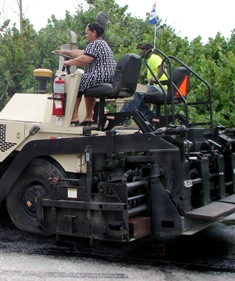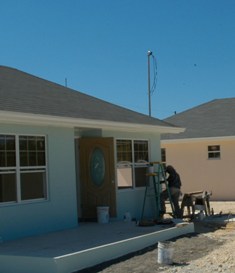Archive for June, 2012

Cops charge one man in latest gas station heist
(CNS): Police have charged a 31-year-old man in connection with a robbery at the Texaco Gas station in Eastern Avenue on 31 May. A policespokesperson said Tuesday that the man is expected to appear in court Wednesday to face charges of robbery, possession of an imitation firearm with intent to commit an offence and theft. Police did not say when the suspect was arrested but had appealed for more witnesses to the gas station heist on Friday. The man is accused of entering the gas station store around 10pm, stealing money from the cashier and then escaping on foot.
The hold-up was the fourth robbery in the space of one week last month, once again stirring up concerns in Grand Cayman about the impact of violent crime on local businesses.
Police are still looking for three masked men who held up the TV station’s customer service office in George Town in broad day light on 24 May and a man who held up a convenience store in Walkers Road at knife point on 30 May. Officers have, however, charged a 20-year-old man in connection with the Bodden Town Cashwiz robbery which occurred the same day. He was charged last week with robbery, possession of an imitation firearm with intent to commit an offence, affray and common assault.
Anyone with information can call detectives on 949-4222, the RCIPS tip-line. 949-7777 or Crime Stoppers on 800-8744(TIPS)
Teenager guilty of murder
(CNS): Full story — A 19-year-old man has been convicted of killing 21-year-old Asher McGaw in East End last September. Justice Alex Henderson found Chakane Jamelle "CJ" Scott guilty of shooting his friend in the early hours of 22 September. In his verdict the judge said the question in this case was whether he believed the crown's main and only eyewitness to the murder, or not. Despite some inconsistencies and inaccuracies Justice Henderson found that 18-year-old Antascio Rankine was telling the truth and pointed to corroborating evidence. The judge also drew an adverse inference from Scott's silence in the judge-alone trial as he handed down the verdict.
Justice Henderson took an hour and a half to deliver the ruling, in which he found Scott guilty of murder as well as possession of a firearm and three rounds of ammunition. He immediately sentenced Scott to life in prison, as mandated by law, as well as imposing two concurrent mandatory minimum ten year sentences for possession of the gun and ammunition used to kill McGaw.
The crown had depended heavily on the testimony of 18 year old Rankine, who was 17 at the time of the killing last September, to make its case against the defendant, who was 18 at the time of the shooting.
The evidence given by Rankine about the night of the murder was, Justice Henderson said, sufficiently detailed to indicate that he was present at the shooting. However, he had to be cautious of convicting based purely on the teen witness and needed to be sure he had given a truthful account. The judge pointed to evidence from Earl Hart, a second crown witness and a cousin to the accused, who supported elements of Rankine’s account and whom Justice Henderson said he found to be a truthful witness.
The judge pointed to three damning issues which raised suspicion regarding Scott’s behaviour and tended to support Rankine’s claim that he was the murderer and which appeared to sway Henderson towards his guilty verdict:
Hart had described a mysterious change by Scott into clothes that did not fit him; secondly, Scott made a comment to Hart about East End being “too hot” as he left the district in the wake of the murder as police numbers swelled at the start of the investigation; plus Hart had overheard Scott threaten Rankine, which dovetailed with the main teen witness's account.
The judge also said that Rankine’s shame and guilt that he had run away and left his friend to die accounted for the young witness's second statement to the police after he had at first denied knowing anything about the crime.
Justice Henderson rejected the defence position that Rankine had lied to the police in his second statement, in which he accused Scott of the killing, in order to get an assault charge he was facing reduced. The judge said he was satisfied that Rankine was suffering from “overwhelming feelings of guilt” when he broke down and told the police about the killing and was not seeking to address his own criminal difficulties.
The judge said he found his explanation at trial for the second statement that he “couldn’t hold it in anymore” truthful.
By contrast, Scott’s silence in the face of a strong case to answer made the judge sure that the defendant, who recently turned nineteen, was guilty of McGaw’s murder.
“The crown provided a body of evidence that demands an answer,” the judge said in his verdict. “If there was an innocent explanation then Mr Scott would be the person to answer. In these circumstances I do draw an adverse inference.”
The crown never provided a motive for the shooting of Asher McGaw (21), who was found with three gunshot wounds to the body and a fourth to the head by police on routine patrol in John McLean Drive in East End last September.
In his evidence Rankine told the court that the three young men, who had all been friends since they were young children growing up close by each other, had gone to the East End clinic to let off a flare gun on the night of the shooting.
At some point while the three men were in the car park of the clinic, Scott turned on McGaw with a real gun. Rankine described how Scott had chased after his best friend shooting at him before the young man fell to the ground. At that point, Rankine said, he saw Scott stand over McGaw as he lay in the road and shoot him again before running away.

Cayman suffers Bahamas heartbreak
(CRFU): The Cayman National Men’s Rugby Caribbean championship for 2012 is over and the qualification process for the 2015 Rugby World Cup drew to a close on Saturday 9 June when the Bahamas lost to Bermuda on their home turf 8-16.Bermuda, who had beaten Cayman by a slim 4 point margin needed to beat Bahamas to stop Cayman’s progress after Cayman’s 20 point win over the Bahamas in Cayman on 26 May and it looked as though Cayman may have been handed just the life line they needed when the Bahamas were leading 8-3 midway through the first half, but Bermuda edged their way forward after a drop goal edged the away side ahead.
A low scoring 2nd half eventually saw Bermuda cross the try line to bring up the final score of 16-8 and both Cayman and the Bahamas rued the fact that the Bahamas missed 5 penalty kicks which, had they been successful, would have made the Bahamas comfortable winners.
Bermuda will now play Guyana in the North American Rugby Championship final in Bermuda.
Whoever wins the Caribbean Championship final will progress in the Rugby World Cup Qualifying process to play the winner of the CONSUR B Tournament between the South American nations of Colombia, Venezuela, Peru and Costa Rica. The Winner of that fixture will play the last place team of the CONSUR A tournament (between USA and Canada to see who progresses.) Whilst it is unlikely that any Caribbean Nation would be successful against either of those sides (both of whom regularly qualify for the World Cup alongside the only Americas team to have already qualified, Argentina) Cayman will be keeping a keen eye on the competitions progress.
Cayman’s win over the Bahamas ensures that Cayman stay in the 2nd tier of Northern Caribbean nations whilst the Bahamas are relegated to join with Mexico and Jamaica in the bottom tier.

Turks and Caicos to go to polls in November
 (CNS): The UK’s Foreign Secretary has confirmed that the Turks and Caicos Islands will have a democratic general election in November. After three years of direct British rule, imposed as a result of a corruption scandal relating to the Misick administration, the UK government says sufficient progress has been made on the milestones it set as a path back to democracy to warrant setting an election date. William Hague revealed in the UK’s House of Commons Tuesday that the election will be on 9 November this year. He also said Britain was committed to ensuring the corruption in TCI never happened again, there or anywhere else in its territories.
(CNS): The UK’s Foreign Secretary has confirmed that the Turks and Caicos Islands will have a democratic general election in November. After three years of direct British rule, imposed as a result of a corruption scandal relating to the Misick administration, the UK government says sufficient progress has been made on the milestones it set as a path back to democracy to warrant setting an election date. William Hague revealed in the UK’s House of Commons Tuesday that the election will be on 9 November this year. He also said Britain was committed to ensuring the corruption in TCI never happened again, there or anywhere else in its territories.
Hague pointed out some of the provisions now in place to “safeguard good governance and sound financial management”, including a revised elections ordinance for clear and robust voting procedures.
“The Conduct of Political Parties Ordinance regulates funding of political parties and campaigns, campaign methods and accounting practices,” Hague told the British parliament. “The Integrity Commission Ordinance increases the number of those required to give personal and financial data about their interests.”
He said changes to the Public Financial Management system, an independent audit office and a chief finance officer would enable the UK government to retain sufficient control over public finances and protect the interests of the UK as loan guarantor.
Listing various other changes still to come, the foreign secretary also pointed to the progress made in the corruption investigation.
“Thirteen people, including four former Ministers, have been charged with corruption and money laundering offences. An international arrest warrant has been issued for former Premier Michael Misick. It is now for the courts to decide whether thepersons charged are guilty. The investigations and prosecutions will proceed independently of a future elected government,” he added.
Hague also pointed to changes regarding the management of crown land as this had been at the heart of the corrupt practices described in Sir Robin Auld’s 2009 Commission of Inquiry report.
“The new Crown Land Ordinance which came into effect in March sets out clear criteria for the allocation of Crown Land. To ensure the new arrangements for Crown Land are implemented successfully, the management of Crown Land has moved to the Attorney General’s Chambers.
The UK government believes seven of the eight milestones have been clearly met, and although the final fiscal milestone has not yet been achieved, Hague said the FCO was confident that the budgeted surplus would soon be reached.
“Over the next few months, in the run up to elections, the interim government will continue with the implementation and consolidation of reforms, in particular to strengthen the public sector and public finances, develop the economy, modernise legislation and make practical preparations to enable the elections to take place,” he said.
“The UK believes that democracy, whether in an independent country or in an Overseas Territory, provides a solid foundation on which to build an accountable and responsive state,” the FCO boss added.
He spoke of the need to support TCI to develop its democracy in line with the UK’s responsibility for security and good governance. “I want to make clear this government’s determination to ensure that there is no repeat of the maladministration that led to the suspension of democratic government in TCI, either there or in any other British overseas territory,” Hague warned.
See Hague’s full statement to the UK parliament below.

PAC to examine latest reports
 (CNS): The chair of the Public Accounts Committee (PAC) has confirmed that members will be meeting this week to examine the latest of the auditor general’s damning reports. Moses Kirkconnell has called a meeting of the specialist legislative committee for Wednesday when it will be looking at the reports on the unlawful spending on paving private parking lots in Cayman Brac, the wasted money at CINICO and the failure of government departments to address the potential risk to the public purse with the government’s fuel card system. This will be the first meeting of the committee since last year.
(CNS): The chair of the Public Accounts Committee (PAC) has confirmed that members will be meeting this week to examine the latest of the auditor general’s damning reports. Moses Kirkconnell has called a meeting of the specialist legislative committee for Wednesday when it will be looking at the reports on the unlawful spending on paving private parking lots in Cayman Brac, the wasted money at CINICO and the failure of government departments to address the potential risk to the public purse with the government’s fuel card system. This will be the first meeting of the committee since last year.
The committee will be examining three reports published by the Office of the Auditor General that show the continued mismanagement of the public funds by various government departments. In the report regarding the Brac paving published by Alastair Swarbrick’s office last month he revealed that more than half a million dollars was spent on paving 56 private lots without legislative authority.
Although the Legislative Assembly had approved spending on paving public roads on the Sister Islands, from the $3 million spent on that project, $521,090 was unlawfully spent on commercial, profit making businesses from the people’s money.
The deputy premier, whose ministry was responsible for making the decision to pave commercial lots as part of the project without authority, has not yet commented on Swarbrick’s findings and has stated that she would be taking legal advice before speaking out.
According to the auditor general’s report on CINICO, the government’s health insurance company, some $30 million of public money was at risk every year because of shocking failures in the management CINICO and a plethora of weaknesses. From managers appointing case management firms without the company or board’s knowledge to a paucity of documents to show how CINICO manages overseas cases, the report reveals a catalogue of poor governance, leaving public money and the government owned company open to abuse.
In his most recent report, Swarbrick and the audit team examined how much government had learned from the internal audit unit’s findings in 2010 about the poor management and risks associated with the government’s fuel car d system. Unfortunately, the return to 'Gasboygate' found government had learned very little and public cash remained at risk.
Swarbrick said that some of the original five agencies audited the first time the office examined the fuel card system had made some improvements but the next ten top government department users of fuel had done nothing to mitigate the risk of abuse with the system.
Despite the fact that four of the first five agencies audited were part of the same ministry the message delivered to public works, the Water Authority and the National Roads Authority failed to reach other departments in the Ministry for District Administration, placing Deputy Premier Juliana O'Connor-Connolly again at the centre of the mismanagement of public funds.

$1.3M found for pre-school
 (CNS): Government has found an extra $1.3 million in the forthcoming budget to invest in the return of Reception classes to public schools. Nine new pre-school classes will open in September at West Bay, Bodden Town and Savannah and parents can register to place their 4-year-old children from Wednesday. The education minister revealed that the funding, which he said would not come as a result of cuts in any other department, is new money from government revenue and the next step on the road to developing the country’s early years education strategy. Some 200 families are expected to benefit from the policy, made possible by the development of new classroom blocks in the relevant schools.
(CNS): Government has found an extra $1.3 million in the forthcoming budget to invest in the return of Reception classes to public schools. Nine new pre-school classes will open in September at West Bay, Bodden Town and Savannah and parents can register to place their 4-year-old children from Wednesday. The education minister revealed that the funding, which he said would not come as a result of cuts in any other department, is new money from government revenue and the next step on the road to developing the country’s early years education strategy. Some 200 families are expected to benefit from the policy, made possible by the development of new classroom blocks in the relevant schools.
Schools in Cayman Brac, East End and North Side had always retained the Reception class, which officials say helps prepare and socialize children for formal school through play-based learning. In most other schools, however, the informal first school experience was removed until a pilot class was introduced in 2011 at George Town Primary. Following the success of the return of the classes at the capital’s school, the ministry is rolling out more classes in the districts to accommodate a further 200 children.
With plans to ensure a Reception class in every government primary school by the start of the September 2013 school year, the compulsory school starting age will be raised to 5.
Speaking at a press briefing on Monday to announce the plans for Reception, Education Minister Rolston Anglin said that this was in line with trends around the world to increase the starting age for formal school and have as many kids as possible in play-based learning environments for longer before beginning the Year 1 curriculum.
He pointed out that in Finland children don’t start compulsory formal school until seven but attend play schools that prepare them for the school experience. Anglin said the goal in Cayman was to bring the compulsory starting age up to six, with a compulsory leaving age at 18.
The new funding and introduction of reception at most of the government schools will not affect the funding of the Early Childhood Assistance Programme (ECAP) for parents who meet the criteria, and the age will be lowered for September 2012 to cover children 3 years and 6 months of age.
“With the reintroduction of Reception we are committed to creating centres of excellence in that important year before children start compulsory schooling, preparing our children for success,” Anglin said, adding that the early years have been an area of focus for his ministry.
“As a government we promised that we would prioritise the re-introduction of Reception, as facilities and resources allowed, and we are making good on that promise. We will continue to do so, until all of our children and their families are catered for, because research shows that the early years are the most important in the growth and development of our future citizens,” he said.
Despite the young age of the children, Anglin spoke about the introduction of Reception as the first step in his ministry’s human capital development strategy.
“To my mind, lifelong learning must mean that we develop strategies to enhance our very youngest people, while at the same time providing ongoing and continuing opportunities throughout life," the minister said. “Reception is not only the best way to ensure your child’s education success, but it is also the foundation of a process of lifelong learning.”
The minister and other experts emphasised that reception is play-based and a kindergarten setting and different from formal school. Although there is a specific curriculum, it focuses on socialisation and not academic learning.
Officials from the education department explained that Reception is a critical element in the education process as it prepares children for school rather than starting their formal learning too early. Experts noted that in some cases children who have just turned fourhave been starting formal school and do not know how to socialize with other children, hold a pen, line up when asked or share. Year 1 primary school teachers have spent the first three months or more helping kids fit into the school environment, which they say is a considerable chunk of the school year lost that should be spent on the formal curriculum.
However, children that attend Reception or formal private pre-schools are better socialized and know what is expected in a group learning environment and, according to local teachers, do far better once they start formal school.
With nine new classes beginning this coming September, the education department is gearing up to help parents access the new classes. Registration will begin next week, at the Department of Education Services, at 130 Thomas Russell Way in George Town, together with special registration sessions planned at selected schools.
Information on Reception, including FAQs and brochures on the new curriculum, will be available for parents registering, and on the Mministry’s website. Queries can be directed to the Early Childhood Care and Education Unit on 244-5724 or turnette.stewart@gov.ky for further information.
See more information below and minister’s statement on early year’s education.

Prosecutors to brush up on forensic skills
 (CNS): The Cayman Islands will be hosting the first ever forensic workshop for the newly formed Caribbean Association of Prosecutors this week when law enforcement officials from the region have their debut meeting. Thirty-nine delegates from the Caribbean British Overseas Territories and the Commonwealth Caribbean countries as well as the UK and Canada will participate along with 23 local delegates, comprising prosecutors and RCIPS personnel including crime scene managers and police officers, officials said Tuesday. The first training workshop, Enhancing the Effectiveness of Prosecutors in a Challenging Environment, will cover transnational crimes and forensic science.
(CNS): The Cayman Islands will be hosting the first ever forensic workshop for the newly formed Caribbean Association of Prosecutors this week when law enforcement officials from the region have their debut meeting. Thirty-nine delegates from the Caribbean British Overseas Territories and the Commonwealth Caribbean countries as well as the UK and Canada will participate along with 23 local delegates, comprising prosecutors and RCIPS personnel including crime scene managers and police officers, officials said Tuesday. The first training workshop, Enhancing the Effectiveness of Prosecutors in a Challenging Environment, will cover transnational crimes and forensic science.
The workshop is organised jointly with the Commonwealth Secretariat, the British Foreign and Commonwealth Office through the Overseas Territories Department Criminal Justice Office in Miami and the Eastern Ontario Regional Forensic Pathology Unit in Canada.
Cayman’s Director of Public Prosecutions, Cheryll Richards, QC, said it meets the association’s objective to ensure continuing education of its members.
“The workshop aims to enhance the delegates’ understanding of critical forensic and scientific data and analysis, transnational crimes’ issues and the care of victims in serious crimes,” she explained. “Such regional training has the potential to significantly improve the quality and delivery of prosecution services across our member countries at a time when the legal environment has become more challenging.”
Experts from the UK, Canada and the Eastern Caribbean are to provide forensic science and pathology training on homicides, expert evidence in DNA profiling, sexual assault, blood spatter pattern analysis and ballistics. The workshop will also underscore the principles of evidence-based cross-examination, the role of the defence expert witness and the effective prosecution of transnational crimes, Deputy Director Trevor Ward outlined.
The conference is also the inaugural meeting of the Caribbean Association of Prosecutors where they will elect officers and determine the way forward.

Global warming could cost region $100 billion
 (CNS): Latin America and the Caribbean face annual damages in the order of $100 billion by 2050 from diminishing agricultural yields, disappearing glaciers, flooding, droughts and other events triggered by a warming planet, according to the findings of a new report to be released at the Rio+20 summit. On the positive side, the cost of investments in adaptation to address these impacts is much smaller, in the order of one tenth the physical damages, according to the study jointly produced by the Inter-American Development Bank (IDB), the Economic Commission of Latin America and the Caribbean (ECLAC) and the World Wildlife Fund (WWF).
(CNS): Latin America and the Caribbean face annual damages in the order of $100 billion by 2050 from diminishing agricultural yields, disappearing glaciers, flooding, droughts and other events triggered by a warming planet, according to the findings of a new report to be released at the Rio+20 summit. On the positive side, the cost of investments in adaptation to address these impacts is much smaller, in the order of one tenth the physical damages, according to the study jointly produced by the Inter-American Development Bank (IDB), the Economic Commission of Latin America and the Caribbean (ECLAC) and the World Wildlife Fund (WWF).
However, the study also notes that forceful reductions in global emissions of greenhouse gases are needed to avert some of the potentially catastrophic longer term consequences of climate change, a release from the Inter-American Development Bank says. The report estimates that countries would need to invest an additional $110 billion per year over the next four decades to decrease per capita carbon emissions to levels consistent with global climate stabilization goals.
“Many climate-related changes are irreversible and will continue to impact the region over the long term,” said Walter Vergara, the IDB’s Division Chief of Climate Change and Sustainability and the lead researcher of the study, whose preliminary findings were presented today in Washington at an event jointly hosted by the IDB and the Center for American Progress (CAP). “To prevent further damages, adaptation is necessary but not enough. Bolder actions are needed to bend the emissions curve in the coming decades.”
Latin America and the Caribbean contribute only 11 percent of the emissions that cause global warming. However, countries are especially vulnerable to its effects, given the region’s dependence on natural resources, an infrastructure network that is susceptible to climate events, and the presence of bio-climate hotspots such as the Amazon basin, the Caribbean coral biome, coastal wetlands and fragile mountain eco-systems.
Estimated yearly damages in Latin America and the Caribbean caused by the physical impacts associated with the a rise of 2C degrees over pre-industrial levels are of the order of $100 billion by 2050, or about 2 percent of GDP at current values, according to the report titled “The Climate and Development Challenge for Latin America and the Caribbean: Options for Climate Resilient Low Carbon Development.”
The study cites climate impacts in areas such as agriculture, exposure to tropical diseases and changing rainfall patterns, among others. For instance, the report cites recent work estimating the loss of net agricultural exports in the region valued at between $30 billion and $52 billion in 2050.
Mexico and Brazil have the largest land distribution just above sea level, making those countries vulnerable to rising sea levels. A rise of one meter in the sea level could affect 6.700 kilometers of roads and cause extensive flooding and coastal damage. A 50 percent loss of the coral cover in the Caribbean from coral bleaching would cost at least $7 billion to the economies in the region.
The study notes that the adaptation costs are a small fraction of the costs of physical impacts, conservatively estimated at 0.2 percent of GDP for the region, at current values. In addition, adaptation efforts would have significant development benefits, from enhanced water and food security to improved air quality and less vehicle congestion, further reducing their net costs.
“Investments in adaptation are cost effective and have substantial co-benefits” said Luis Miguel Galindo, Chief of the Climate Change Unit of ECLAC, a key contributor to the study. “Also, some of these adaptation measures are very easy to implement and have significant positive impacts.”
Though adaptation is important, substantial investments are also required in order to drastically cut the region’s projected carbon emissions to levels consistent with global climate stabilization goals.
Under a business-as-usual scenario, Latin America and the Caribbean would contribute 9.3 tons per capita of greenhouse gas emissions by 2050, up from the current 4.7 tons per capita. The report identifies pathways to bend the emission curve to two tons per capita, by promoting zero net emissions from deforestation and other land-use practices by 2030, combined with efforts to eliminate the carbon footprint in the power matrix and transport infrastructure by 2050, at an annual cost of $110 billion.
“Yes, spending $110 billion a year for a region that faces major development challenges is not an easy proposition,” said Pablo Gutman, the Director of Environmental Economics at the WWF. “However, this would also bring about major benefits such as improved food and energy security; people would have healthier lives in cleaner environments.”
“In the long term,” added Vergara, “this is the surest way to ensure Latin America and the Caribbean continues to prosper along a sustainable path.”

Ex-housing official charged
 (CNS): The former deputy chair of the National Housing Development Trust has been charged with three counts of obtaining money by deception, one of attempting to obtain money by deception, four counts of obtaining a pecuniary advantage by deception and one count of attempting to obtain a pecuniary advantage by deception. It is almost seven months since Edlin Myles (60) was arrested under the anti-corruption law in connection with fraud relating to the government’s affordable housing project in East End. Myles is accused of manipulating his former position on the board to sell insurance to applicants who applied to buy homes on the East End site.
(CNS): The former deputy chair of the National Housing Development Trust has been charged with three counts of obtaining money by deception, one of attempting to obtain money by deception, four counts of obtaining a pecuniary advantage by deception and one count of attempting to obtain a pecuniary advantage by deception. It is almost seven months since Edlin Myles (60) was arrested under the anti-corruption law in connection with fraud relating to the government’s affordable housing project in East End. Myles is accused of manipulating his former position on the board to sell insurance to applicants who applied to buy homes on the East End site.
Myles, who was charged on Monday 11 June, has been released on police bail pending his court appearance, which is expected to be next week.
The RCIPS launched the investigation into allegations of misconduct within the National Housing Development Trust after complaints were filed about Myles. He was originally arrested at his home in George Town in October 2011 under sections 13 and 17 of the Anti-Corruption Law 2010 for breach of trust and abuse of public office, as well as suspicion of obtaining property by deception.
At the time of his arrest Myles was one of only three remaining members of the NHDT board after several resignations.
Meanwhile, the community affairs ministry, under which the NHDT falls, is planning to break ground on a new affordable housing site in Bodden Town on Thursday at Lake Destiny Drive, near the police station, where officials say twenty new government houses will be built.
Mike Adam, the community affairs minister, UDP backbencher Ellio Solomon and Rayal Bodden, the new Chairman of the Trust, are expected to be at the groundbreaking event.

Turtle swims towards home in new found freedom
 (CNS): Sir Thomas Turtleton, a former long term resident of the Cayman Turtle Farm, has made the most of his new found freedom. The turtle, which was released last weekend to celebrate Queen Elizabeth II’s diamond jubilee, has dodged the poachers and made it all the way to the Nicaraguan border. The 60-year-old turtle, which weighs some 600lbs, was originally caught near Surinam, South America, in the 1970’s as an adult male and was part of the initial captive breeding stock at Mariculture Ltd, which became the Cayman Turtle farm. According to the satellite tracker fitted onto Sir Thomas, in just over a week of freedom the turtle has travelled 372 kilometres towards his original home.
(CNS): Sir Thomas Turtleton, a former long term resident of the Cayman Turtle Farm, has made the most of his new found freedom. The turtle, which was released last weekend to celebrate Queen Elizabeth II’s diamond jubilee, has dodged the poachers and made it all the way to the Nicaraguan border. The 60-year-old turtle, which weighs some 600lbs, was originally caught near Surinam, South America, in the 1970’s as an adult male and was part of the initial captive breeding stock at Mariculture Ltd, which became the Cayman Turtle farm. According to the satellite tracker fitted onto Sir Thomas, in just over a week of freedom the turtle has travelled 372 kilometres towards his original home.
The turtle was released into the North Sound on the afternoon of Saturday 2 June after more than three decades in captivity. He is fitted with a satellite tag which is programmed to transmit when Sir Thomas surfaces and collect dive data and GPS positioning when he is underwater. Data reports so far show the turtle has been travelling at an average speed of 2.3 km/hr (1.4 mph). Over a set of 4-hour sampling periods, his maximum dive duration has ranged from 21 to 24 minutes, and after years of being in a shallow tank Sir Thomas is making the most of the ocean, having spent up to 97% of his time under water.
By Monday morning Sir Thomas Turtleton had arrived at the continental shelf off the coast of Honduras, near the border of Nicaragua. He was in the water between 100 metres and 200 metres deep and was still heading southwest. His average speed slowed down when he reached the shallower water.
You can follow Sir Thomas at http://www.seaturtle.org